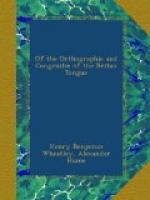4 (sic). This difference of c and s is the more attentivelie to be marked for that wordes of one sound and diverse signification are many tymes distinguished be these symboles; as, the kinges secrete council, and the faithful counsil of a frende; concent in musik, and consent of myndes; to duel in a cel, and to sel a horse; a decent weed, and descent of a noble house. These tuo last differres alsoe in accent.
5. Lykwayes, that we derive from latin verbales in tio, sould also be wrytten with t; as oration, visitation, education, vocation, proclamation, admonition, etc.
6. Wordes deryved from the latin in tia and tium we wryte with ce; as justice, from justitia; intelligence, from intelligentia; vice, from vitium; service, from servitium. In al q_uhi_lk, houbeit the e behind the c be idle, yet use hes made it tollerable to noat the breaking of the c, for al tongues bear with sum slippes that can not abyde the tuich stone of true orthographie.
7. C is alsoe written in our wordes deryved from x in latin; as peace, from pax; fornace, from fornax; matrice, from matrix; nurice, from nutrix, q_uhi_lk the south calles nurse, not without a falt both in sound and symbol; be this we wryte felicitie, audacitie, tenacitie, etc.
8. Lykwayes we sould keep the vouales of the original, quherin the north warres the south; from retineo, the north retine, the south retain; from foras, the north foran, the south forain; from regnu_m_, the north regne, the south raigne; from cor, the north corage, the south courage; from devoro, the north devore, the south devour; from vox, the north voce, the south voice; from devoveo, the north devote, the south devoute; from guerrum, the north were, the south war; from gigas, gigantis, the north gyant, the south giaunt; from mons, montis, the north mont, the south mount. Of this I cold reckon armies, but wil not presume to judge farther then the compasse of my awn cap, for howbeit we keep nearar the original, yet al tongues have their idiom in borrowing from the latin, or other foran tongues.
OF SUM IDIOMES IN OUR ORTHOGRAPHIE.
Cap. 8.
1. In our tongue we have some particles q_uhi_lk can not be symbolized with roman symboles, nor rightlie pronunced but be our awn, for we in manye places soe absorb l and n behynd a consonant, quher they can not move without a voual intervening, that the ear can hardlie judge quhither their intervenes a voual or noe.
2. In this case sum, to avoid the pronu_n_ciation of the voual befoer the l and n, wrytes it behind; as litle, mikle, muttne, eatne. Quhilk houbeit it incurres in an other inconvenience of pronu_n_cing the voual behind the l or n, yet I dar not presume to reprove, because it passeth my wit how to avoid both inconveniences, and therfoer this I leave to the wil of the wryter.
3. Sum of our men hes taken up sum unusual formes of symbolizing, q_uhi_lk I wald wish to be reformed, yet if I bring not reason, let no man change for my phantasie.




